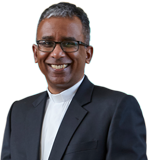Homily for Solemnity of the Immaculate Conception
The teaching of the Immaculate Conception tells us that Mary from the first moment of her existence was totally free from the influence of that universal sinfulness which touches us all from the first moments of our existence. We come to be in a world broken by sinfulness and not one aspect of life is free from this. But God has never left the human race without his help and at the fulness of time he worked our salvation; Mary was to be the mother of the Saviour, and so on the side of the cause of salvation; she gave birth to the human being who saves us all and so it was fitting for her to be preserved from the brokenness which affects us by the grace of her Son.
The First Reading evokes the image of sinful brokenness which we experience, of the disobedience which brings pain and suffering. This brokenness becomes part of our being human in the world and we spread it everywhere. The wonder of God’s mercy is that in his Son, Jesus, born of the Virgin, God turns our human nature into an instrument of the healing of the world, the reconciliation of all people.
The Gospel speaks, not of Mary’s conception, but that of Jesus. It begins the moment Mary says that ‘Yes’. The angel greets her as “full of grace”, filled with God’s love and God’s favour, specially singled out for this moment.
Through our baptism and through grace we can become actors in the healing of the world, the reconciliation of all. We can be instruments of grace or instruments of sinfulness and we know that we go easily from one to the other.
Our humanity can only be a healing, reconciling humanity if we seek to live in obedience to God, if we accept and respond to God’s grace. We need grace, which our second readings celebrates as God’s free gift to us in his beloved Son. Mary was preserved from the influence of sinfulness, was able to say her ‘yes’ to God because of grace. Grace – God’s gift – enabled her to be all that she was, to respond to God as she did. All is grace.
Many centuries ago St Augustine helped the Church clarify her teaching that we cannot do the good, we cannot be saved without grace. Then some said that maybe the initial movement to God, the first turning to God is possible without grace. But the Second Council of Arausio or Orange in 529 taught that we cannot even want to do good without grace; every movement to God is a work of grace, a grace which comes before we do anything, prevenient grace. Grace prompts and makes it possible for us to do the good which heals and saves. We cannot do the truly good without God’s help. And this help God gives generously, we just have to be open, with the help of his grace, to God’s ways which are not our ways.
We are all too often the cause of sin and pain in other people’s lives. Let us turn to the Lord, with the help of his grace, pray for his grace, pray to become more obedient to him after the example of Mary, only then can we be people who bring wholeness and healing into the lives of those around us, into our world which hungers for the balm of grace.
O Mary, conceived without sin, pray for us who have recourse to thee.

